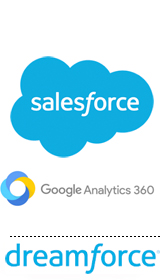 Salesforce is partnering with Google for an integration that will enable sales, marketing and advertising data to flow between the Analytics 360 Suite and Salesforce’s Marketing and Sales clouds. Read the Google blog post.
Salesforce is partnering with Google for an integration that will enable sales, marketing and advertising data to flow between the Analytics 360 Suite and Salesforce’s Marketing and Sales clouds. Read the Google blog post.
The integration of 360 and Salesforce’s Marketing and Sales clouds will be available in the first half of 2018 at no additional cost, the companies said Monday at Salesforce’s Dreamforce conference in San Francisco. Until now, there were no pre-existing integrations between Analytics 360 and Salesforce, so they had to be used separately.
“Today, for customers to try to take a segment out of Google Analytics and bring it directly to Salesforce Marketing Cloud for an engagement is a little tough,” said Bob Stutz, CEO of Salesforce Marketing Cloud and chief analytics officer at Salesforce. “But under this new [partnership], it’ll be seamless to bring those audiences directly into the Marketing Cloud.”
For the first time, marketers can build custom audiences in Analytics 360 and feed them to the Marketing Cloud for activation across direct marketing channels.
Marketers will also score a holistic dashboard for their consumer engagement data so they can better gauge how campaigns are performing, such as whether customers who received email promotions clicked to learn more or bought a product. Marketing Cloud data related to any interactions between brands and customers will be visible in 360, allowing marketers to create audience lists.
Salesforce Sales Cloud customers will be able to tap Google’s ad platforms to gain a granular view of the sales cycle, understand how customers interact with brands and identify new customers. They can also use the sales data in 360 for attribution and bid optimization.
The integration was a response to customer feedback, said Paul Muret, Google’s vice president of display, video ads and analytics, who was part of the Google Analytics team when it launched years ago.
“In those early days, digital marketing and analytics was really a silo inside an organization,” Muret said. “It wasn’t connected across anything, and I can tell you that has completely changed in the last couple years. The No. 1 ask I get from my large advertisers and marketers is to combine their online and offline data and help them get a single view of customer journeys that they can take action on across all their touch points.”
The move will be a positive development for marketers, said Martin Kihn, vice president of research at Gartner.
“Users of Salesforce Marketing Cloud will find it convenient when it becomes available because most of them also use Google Analytics,” Kihn said.
The Google-Salesforce partnership also includes an integration between Salesforce and Google’s G Suite. Salesforce Lightning will hook up with Gmail and Google Sheets, and there will also be new Quip Live Apps for Google Drive and Calendar. The Lightning for Gmail, Calendar and Drive integrations are already complete, but deeper integrations are planned for 2018. Select Salesforce customers will receive free G Suite licenses for one year.
G Suite will become Salesforce’s preferred email and productivity provider, while Google’s Cloud Platform will be used for Saleforce’s core services as Salesforce expands its infrastructure globally.
